Long-time Alison Krauss & Union Station bassist tells FBPO all about his bluegrass roots, instructional DVD, the Nashville scene and more!
Exclusive interview with FBPO’s Jon Liebman
October 22, 2012
Perhaps best known as the long-standing bass player for Alison Krauss & Union Station, Barry has become one of the most in-demand session players in the business. He has recorded and performed with a diverse range of artists, including Merle Haggard, Shania Twain, the Civil Wars, Elvis Costello, Dolly Parton, the Chieftains, Del McCoury, Vince Gill and many others.
A native of Kingsport, Tennessee, Barry Bales has been immersed in music, almost from birth. Surrounded by some of bluegrass music’s most influential musicians, Barry focused his passion and talent on the acoustic bass at an early age, eventually performing and traveling with various regional bands.
Barry was heavily involved in several motion picture soundtracks, including Oh Brother, Where Art Thou; Get Low; Divine Secrets of the Ya-Ya Sisterhood and Walk the Line. He has been awarded fourteen GRAMMY awards, one Country Music Association award, an Academy of Country Music award and eleven International Bluegrass Music Association awards, including Bass Player of the Year.
FBPO: How would you describe your musical upbringing? You come from quite a musical family.
BB: My Dad played guitar and mandolin. He would sit in the living room, playing and singing most nights after supper. He also had a bunch of great vinyl – Merle Haggard, George Jones, Bob Wills, Ray Price, Bill Monroe, Flatt & Scruggs, Osborne Brothers, Reno & Smiley, etc. Whether coming from him, the record player, the TV or the radio, I was surrounded by country and bluegrass from birth.
When I was 10, I decided I wanted to learn to play guitar. Dad had the foresight to insist I go to a “real” teacher. At first, I hated it. My parents had to make me practice. I would watch the clock the whole time. Then one day, it just “clicked.” After that, they would have to make me put it down to go to bed.
After a couple of years, I wanted to learn banjo. That was where everything really changed. I started taking lessons at a place called the Guitar Shop from James Alan Shelton, who currently plays lead guitar for Ralph Stanley. The Guitar Shop was the local bluegrass hot spot, the place where everybody went to hang out and jam on Saturday. It introduced me to the local bluegrass scene and, consequently, some of my best friends and some of the most influential bluegrass musicians in the genre today. We all kinda grew up together. I started jamming with really good players, started playing in bands, started going to shows. It really opened up my musical world.
FBPO: How did settle on the bass?
BB: The bass always intrigued me. Whether jamming at the Guitar Shop, a festival or at somebody’s house, I would always pick up an acoustic bass and fool around with it every chance I got. I was just drawn to it and it seemed to come easier to me than other instruments. It just seemed intuitive almost.
My parents got me a P-bass for Christmas one year. Not long after that, I was asked to play bass in a local bluegrass band. One of the guys owned an upright, so I would switch back and forth a lot. That’s where I really got a lot of good “hands-on” time.
FBPO: At what point did your career really begin to take off? Did it all happen very gradually, or was there a defining moment that made you realize you were about to become a professional musician?
BB: I had been playing in local and regional bands, starting to break into the bluegrass festival world a little bit more all the time. I was still going to college. Then I got the gig with Alison. That was it. That was my first truly professional, do-nothing-else gig. They were still very small-time when I joined, compared to now. But it was a gigantic step for me. I didn’t even ask what I was going to get paid. I just knew I was becoming a professional musician.
FBPO: How did the Alison Krauss gig come about?
BB: In the bluegrass world, summer festivals are the bread and butter. There’s one somewhere every weekend. Most bands will play two or three different festivals in the same weekend. Each day, there are five, ten, sometimes fifteen bands on a bill, so you are seeing a lot of different musicians and bands on an almost daily basis.
Bluegrass musicians are mostly very social, so everybody kinda just hangs out backstage or at the record table, watching all the other bands. Most bands and bandleaders, whether they would admit it or not, make mental notes on players from up-and-coming bands that would be good replacements, if need be. I was playing in a band called Dusty Miller. We got to know Alison/Union Station. We were big fans. When there was a change, Alison hired three of us from our band all at once: Tim Stafford, Adam Steffey and me.
FBPO: Tell me about playing in that band, Union Station.
BB: It’s been the greatest thing in the world. You talk about “on-the-job training!” I thought I was pretty good when I joined, but it didn’t take me long to see I had a lot to learn. My second gig was the Telluride Bluegrass Festival, in front of 10,000 people. Within the first three months, we went to Finland, Sweden and Japan. For a country boy from East Tennessee that didn’t know anything, that was quite an eye-opening summer.
It was professionalism and precision on a level I didn’t really know existed. It’s such a great thing, something most people strive for and never achieve, to walk onstage with a group of people where you are the only one you have to worry about. Cut your gig and everybody else will handle theirs.
I’ve been there twenty-two years. There’s been a lot of great musicians who’ve come and gone. Having been around that long, sometimes things aren’t as obvious to me as to outsiders, but I’m beginning to realize that we’ve actually made a pretty big mark on the music world. We’ve created something very special and recognizable. The five people in this band right now have a very unique sound that touches a lot of people and that is unbelievably gratifying. I’m very blessed.
FBPO: The studio scenes in New York and L.A. have changed so much over the past couple decades. How about the Nashville scene? While there are parallels with other cities, Nashville seems to have a vibe all its own.
BB: Nashville definitely has its own vibe. Up until just very recently, Nashville still had a very small town feel. There wasn’t any place in town that you couldn’t drive to at any time and find a great parking place. Except for the heart of rush hour, you could go anywhere just about any time with ease. It’s only recently started to “grow up” in that regard, but compared to New York or L.A., it’s still so laid back. The studio scene is very much that way too.
Now, the sessions for Top 40 country radio type stuff, the major label/hot new artist stuff, can be on the stressful, self-important side. But even though that part of the business sometimes thinks it’s the only part of the business, there’s so much more going on in town. By and large, the musicians are the best in the world and are really great people to boot. Even the best, most sought-after players in town will leave a master session at the end of the day and go down to play at a local beer joint for tips and fun. There’s a huge sense of community with the Nashville music crowd. And with the advent of smaller, cheaper home studio rigs, there’s great music being created everywhere, all over town. And it’s not just country music. There’s lots of great indie and Americana. And of course the songwriting scene is just unbelievable.
FBPO: Tell me about your DVD release, A Solid Foundation to Acoustic Bass.
BB: I got to talking with John Lawless from AcuTab about the possibility of doing an instructional DVD. I’m no music teacher and most of what I do is by ear and by feel, but I’ve always had a lot of folks that liked my playing and people were always asking me about how I do this or that. So we decided to put something together to show the way I approach things.
I don’t claim that it’s all technically “correct” or would hold up in front of a music jury, but it’s my approach, the way I hear things, the way I play. I talk about some of my influences, I demonstrate my technique, I show how to “build” a song and then play it with a band and how to play variations and things other than I-V. I think there’s something there for everybody. It’s great for beginners, but even folks who have been playing for a long time can learn a new way of looking at something.
FBPO: What else is keeping you busy these days?
BB: Alison Krauss & Union Station are about to wrap up two years of touring in support of our Paper Airplane release. After that, I’ll be going on tour with Mac Powell, lead singer for the band Third Day. He’s released a country album and is going to be touring for it on into November. I’m going to be playing electric bass, which I love but don’t get to do very much, so I’m extremely excited!
I’m also getting more involved in producing. I’m currently working with a great singer named Tim Shelton. And I will also be going in the studio in October to produce a new project with Russell Moore & IIIrd Tyme Out. They are a great bluegrass band that just got nominated for almost every award possible for this year’s IBMA awards.
FBPO: How about the future? What else is on the horizon?
BB: It looks like we will be going back to work in the studio with AKUS before too much longer. I also hope to keep producing, recording and touring with other acts as well. And I’ve been getting a lot more involved in songwriting. I love variety in my work. I love working with different folks in different settings. It keeps things fresh and always puts you around new ideas and new ways of doing things.
FBPO: What would you be if you weren’t a bass player?
BB: I love to hunt and fish. I live on our family’s farm. I do a lot of work managing wildlife habitat. Being outside, being on the tractor helps me clear my head. I figure I would be involved in farming and/or wildlife in some way, full-time.
I’m trying to find time to get some animals back on the farm. I put out a bigger garden every year. It’s a great life away from buses and airports and hotels. I want my son to grow up close to the land. Maybe I can do both!
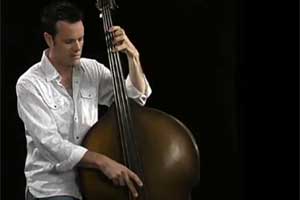
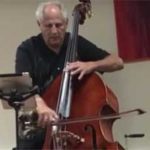
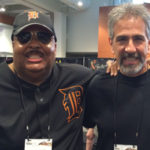
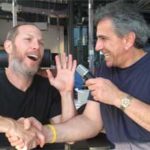
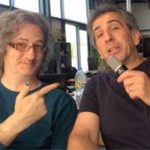
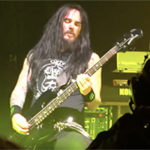
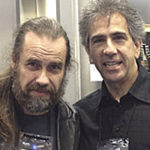
Hey Barry this is Marty McIntosh from Missouri, I’ve really enjoyed watching your career soar since we met,saw you a few times in KC (Uptown Theater) love to hear from you